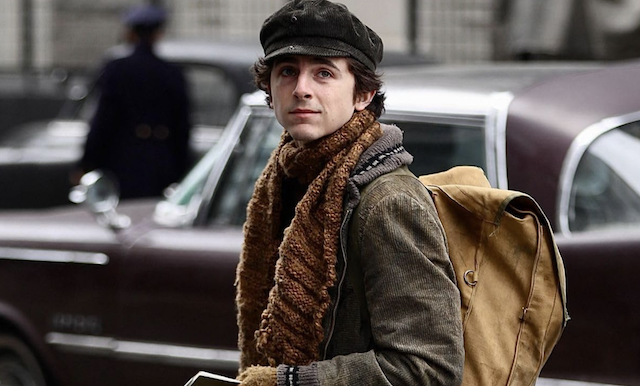
©Courtesy of Searchlight Pictures
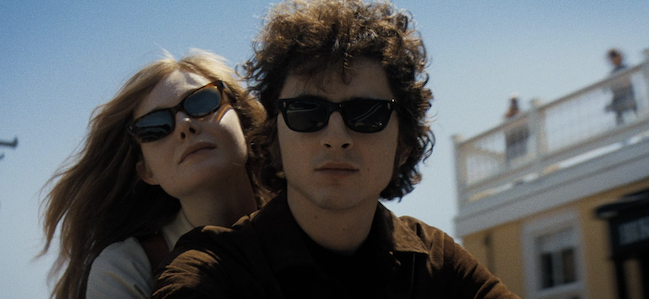
©Courtesy of Searchlight Pictures
Q&A with Actors Timothée Chalamet, Elle Fanning, Boyd Holbrook, Monica Barbaro and Director James Mangold
Q: So my first observation doesn’t work as well without the full statement, I really think of this crew, or I thought of it more as a band, like a gathering band on stage, than necessarily a cast in the traditional sense. And as for me, as I mentioned to the audience earlier, I just was so mesmerized by the fact that you leaned into the music rather than necessarily the myth or mythology, and to ground it in songs and in the music, it really, for me, was a hugely important thing. And James, was that always something that was going to be central for you?
James: Well, I never thought about it as leaning into the music, I just thought it was the story, that for a character who didn’t explain himself much, he also does an awful lot of telling us about himself. At this point, 55 albums of entirely self-written music. I mean, I get why people refer to him as an enigma, a mystery, all that but then I also don’t get it, because like, Frank Sinatra, I don’t know if he wrote more than one song. Like, why is Bob such an enigma, when he’s given us so much personal poetry all his life, and what do we actually want from him, in addition to this motherlode of art work. But the real thing you’re saying, and I think it’s really true, is like, Elle and I were friends before we made this movie, Timmy and I became friends over the five years of making this movie, it is true.
And Monica and Boyd have made several movies with me, there is an aspect to this, that what you’re saying is really true. And in terms of structuring the movie, I just felt that Bob, there was such a coolness to Bob and the music, that I felt it would be like a hat on a hat, trying to make an overtly kind of cool movie about a cool person. And that, if anything, I just wanted to sit back and let the story do the work. And if anything, because I got the chance to meet Bob, I don’t want to say humanize him as if I’m in a PR campaign, because I’m not, but humanize because he’s a human and not an enigma. And he actually eats, and does things, and writes music, and watches movies, a lot of movies, and that I found nothing enigmatic about him when I was with him. And that other than a deeply creative soul.
And so I wanted to investigate that, whether that even contradicted what people want. Because I think in some ways people want them to be an enigma. And I think it’s a worthy thing to talk about. He’s also a person who had feelings, who also had the burden of genius, whatever that is. I thought this movie is bigger than just about him, it was about the burden of what it is to have this… I mean, just think about it. Just take the songs that he sang in the movie, right? And think of the influence, power, and longevity of those songs, and that this young man wrote them between the ages of 19 and 23. And that’s only the very beginning. That’s only a real sampling of what he wrote in that period.
And a minor sampling of what he wrote over the last 60 years. And the level of gift that was running through this man’s body and mind is even, he says, beyond his own understanding. And I think it can produce you feeling weird about the adulation, or dwarfed by how much people want you to explain what you’re doing, or explain your art, or what is that lyric you’re singing. And I wanted to try and avoid all of that. And just go, this is a person with an incredible gift, and this gift affected these other characters profoundly.
And in some way, it was my kind of, Milos Foreman used to be my teacher, was kind of my “Amadeus” effort. It’s a movie entitled Amadeus, but it’s really a movie about Salieri, and the king, and all these people, and how talent makes people idolize, covet, and creates envy, jealousy, resentment, competition, and all these things further isolate the person with the talent that could explain some of that enigmatic behavior that is not enigmatic at all, but a natural withdrawal from a lot of questions. [audience applause]
Q: Of all the characters that are in the film, all of them, or all of the central characters, at least, are based on … except for one which you created in a sense, right? She’s…
James: I just made up a different name for her. I wrote her as the character she was.
Q: So why was… maybe you can talk about that. Did Suze changing her name to Sylvie, in this case, give you any more latitude in developing that, or was it how… I’m wondering, like, what was the idea behind that, or how did it help you, or not help you?
Elle: Well, I think… I guess there’s a lot of parts to this question, but initially, it was Jim who told me, because, you know, like he said, he worked with Bob in the script at times, and they had, um… You know, we had conversations, and one of the things that Bob said to him was that he would like it if we changed Suze’s name in the script. And so I think, you know, that stood out to me, and the fact that… I guess I’m probably putting it, you know, not putting words in his mouth, but I think also the things that he said about Suze in the past. It seems like she is very special to him now.
Suze has passed away, so there’s a protection there, and like you touched on in the film, you know, she wasn’t a public person, and also, you know, like you said, the challenge of this part was that I am playing someone that isn’t as well known. She’s not a singer, and I didn’t have to learn to sing or play an instrument, but I think kind of the crucial part of the story for me is building that relationship with Bob, because I think when Bob… I mean, this was Timothee’s choices, but when he’s with Sylvie in the film, there’s a comfortability and safeness, and it’s a different relationship with everyone else, and so I was very aware of that. I’m a little distracted. Is everyone coming in?
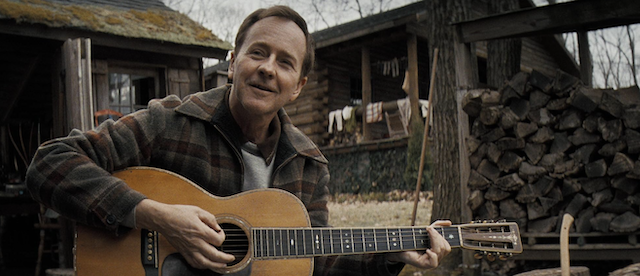
©Courtesy of Searchlight Pictures
Q: You guys changed out of your SantaCon costumes really quickly.
Timothée: It’s almost like I’m not from New York now knowing that traffic, that was brutal. I apologize.
Q: We started off talking a little bit about how central the music is and how perfect that is, in a sense, and Jim and Phil were saying on his kind of, like, journey of creating the art and leading into what Dylan has already told us through the songs, and then Al was describing creating Sylvie out of Suze and out of her character in the story. Let’s get the whole stage. … In a way, Sylvie becomes the anchor. She’s what Bob is. She does bring a perspective, and she’s an activist background, and she helps form him, but she is that kind of rock, that foundation for him.
Elle: Yeah, and I think I was also aware of not wanting to just make her just a girlfriend part in the film. You know, also Suze Rotolo wrote “A Freewheeling’ Time” that I read, and she was such a strong, interesting, complex person, and I wanted to bring that to her and bring her strength, and she was an activist at the time, and introduced Bob to politics and encouraged him to sing his own music, and so I wanted to have that sturdiness, but obviously there’s a real emotional core there, and I think being surrounded by the music in the film is really helpful for me to have the live performances, because it really opened me up to be listening to this music and everyone sang live on set, so to be surrounded by that was very special for me.
Q: Mr. Chalamet, welcome. the sound and energy that you bring to Bob Dylan, to the songs, it’s astonishing. I mean, people are just discovering this picture, and they are just mesmerized. [loud applause] Was there a separation between acting and being a musician in this case, because we really watch you be a musician, right? Sing, play, do that, but you’re also inhabiting a character, and I’m just wondering about was there any separation for you, or was it all melted together?
Timothée: Well, firstly, I really appreciate your generous words. This is a project I’ve worked on for five and a half years. This is an artist who’s really dear to my heart, and at least near and dear to my career, and we wanted to do him justice and not to be a smudge on his legacy in some way. You know, I went to LaGuardia (High School of Performing Arts) in the city… This is not musical theater, but we had a great teacher that said, you know, musical theater is usually acting on pitch, and while this isn’t acting on pitch, the lyricism and the point emphasis of these songs, you know, there’s always an intention and direction, and trying to make the scene there’s always an intent to the scene.
You know, you’re not watching high-level karaoke, there’s always something to the scene. I can see there, you know, seeing through Sylvie’s eyes, a moment of jealousy between Bob and Joan, while Bob sort of, she’s at the top of the stratosphere in the folk community, and I thought, gee, what was in his eyeline? Because I’ve become such a fan of Bob. I was happy to try to bring his songs to life. I kept my eyes on the plot and working with Jim whose biopic “Walk The Line” about Johnny Cash starring Joaquin Phoenix was astounding. And most crucially, and least sophisticatedly, if that’s a word, I love these songs. I love this artist. These songs are deeply impactful and moving. I wanted to bring these to life because they’re not as, you know, these are songs from the 60s. I wanted all of us to be a humble gateway bridge to this incredible artist. [applause]
Q: Absolutely. You mentioned that you worked on this for 5 years. Fill us in on your process. I know a lot of people sort of speculating that there’s a method or whatever, but tell us what you actually did.
Timothée: You know, I don’t know what my process necessarily was, besides just trying to sink into all the material as much as possible.

©Courtesy of Searchlight Pictures
Q: Boyd, this is not your first time working with James, and it’s not his first time working with Johnny Cash. Was that added pressure to the project? Obviously you had a working relationship already, but the fact that he had already created a version of Johnny before he worked with you on it, was that helpful? Hurtful?
Boyd: Yeah, it was a daunting realization. First of all, the film was meant to celebrate people’s lives, and yes, Jim has made the incredible movie “Walk The Line” with Joaquin. That’s kind of daunting to think about following in the footsteps of that. But if you stay thinking about that, or stay in that moment. I think that was maybe half a day that I thought about that. Talking to Jim about that, my concern was that I don’t look like Johnny Cash. [audience cracks up] It was a different time and whatever Jim saw in me, I trusted him with the progress that we made, and every single one of Jim’s films that I’ve been on are all significantly different.
The process is the same, getting to that character. I trusted him through the projects that we made. And there’s this process in every single one of Jim’s films that I’ve been on, they’re all significantly different, but the process is the same. Getting into that character and helping make it unique. So I knew that would be there. And then I like to echo what Timmy’s saying is then it’s just the 10,000 hours and three months or how much time you have to realize and make the impression of that character in a way where it wasn’t trying to be too talky or do a caricature of Johnny Cash. I just wanted to figure out how to be in his shoes and play the music and catch up. That’s an incredible amount of pressure that actually excites me. I think that’s why we all love performing because its a rush just to be a little bit in these people shoes and play the music.
Q: I have to say, your Johnny Cash is phenomenal. {loud applause] Alright Monica, first of all, I have to say, here in the film department, we are massive fans of “The Cathedral”. So anyways, you’re a star hero already, but your starburst out this picture like a rocket. I mean just everybody that’s experienced it, has experienced your Joan and it’s like eating breakfast truly. [audience applause] What a jaw on the floor performance? How did you find this Joan? Obviously working with Jim, but where did you come up with it?
Monica: Not to be a broken record, but as Timmy said, you try to absorb the character by osmosis of the background material that we spent hours with. You just try to put all the pressure on the fact that there’s so many people who rightfully admire Joan and are huge fans of her. You try to put that pressure on a shelf and just everyday dedicate yourself to learning what bits of the person you can use to represent them. And she had some definable qualities like that vibrato and her voice and singing songs in a key that at the time I was cast, I couldn’t sing that high and wasn’t a singer and didn’t play guitar. So it just is absorbing all of that to just training constantly and then in the meantime watching all the documentary footage and reading and just again absorbing everything.
And then the fun of it when you start to merge all of these sort of pillars of research and preparation is when you’re singing a song and you’ve been reading about her and you know about her family and then you realize she hovers in “House of the Rising Sun” in a version that’s so unique to her, which she was generous enough to give all of her arrangements to the film. She could have said no, she hovers on the word sister in a way that’s really interesting and you’re learning about her relationship with her sister. What’s that? And so you’re just deep diving into these people and the way they sing the songs.
And then I think at the end of the day, a really cool thing about music that I learned that I’ve come out with, I mean aside from just immense respect for musicians who perform live, it’s like we perform live, they do that constantly. I just admire that so much. But the best musicians are storytellers and they’re sort of telling the same monologues over and over and over again to crowds way bigger than this and doing it with feeling and that ability is a part of what makes all of these people that we got to represent so miraculous. Of course they have these brilliant words that Bob wrote, but to be able to tell that story over and over is just genius. And then again, all that reverence you have to put on a shelf and try to be as big as that, which is a challenge.
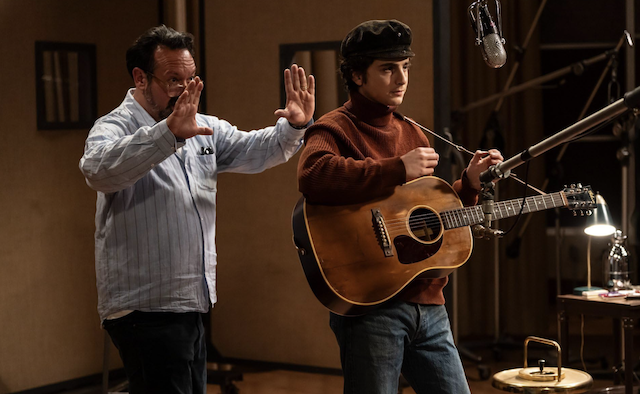
©Courtesy of Searchlight Pictures
Q: James, speaking with Bob Dylan about, or I’m assuming about the picture as well. And you mentioned that he’s a big cinephile. Did he give you notes on this?
James: Well, he read the script and yeah, we went through it, I mean but the notes were never, I was waiting for them to be like, can’t do this or that never happened or it was more like I never saw that stanza or after I wrote it I cut that. Or Pete always called me Bobby, it was never Bob or this one. Or he told me the story of Albert Grossman and this pistol that he’d carry under his jacket because he had run from someone in the Chicago mob before he came to New York. This was his second career. He had run jazz clubs in Chicago. He was always paranoid that there was someone after him, and like Monica was saying, all this stuff, it’s osmosis for me too.
I’m drinking in all this stuff from Mr. Dylan and all the research materials that the cast has just mentioned and more, There’s great books about Pete Seeger as well. And what then happens is you end up with this big stew in you. And the beautiful thing about this project is no one stopped me from writing. No one stopped them from exploring that stew and finding what was real for them. I mean it was easier to protect them because they’re kind on Team Jim and I can try to create that bubble. But also the studio and even Bob Dylan, we didn’t have, I never had this moment of you can’t do that. The only thing he asked was what you mentioned before was that he felt that Suze was kind of a civilian and that there was just everyone else in the movie and bargained for being famous. And so there was just some self-consciousness about putting her that way in the movie that he wasn’t nervous about the other players in the scene.
Q: The other thing other than the deeper appreciation for the way you all treated the songs and music was how timely this film feels to our time right now. And I felt that in observing a generation that was using its music, its poetry, its art to try and make a better America and how necessary that felt when I saw it a few weeks ago. And I feel that would become more and more urgent no matter where you fall for this generation, the generation of your task perhaps to lean into its art and its ability to use that skill, those talents to make things better in whatever sense that we mean for this generation. So I’ll start with the past. If working on this film now, seeing the film has inspired you in any way to take your talent, your work and amplify what you would want for your generation in a different way, [long silence before audience break out in laughter]
Monica: It’s also interesting, even with his songs with “God on Our Side”, it’s not nearly as popular of a song as many other songs that he sang. And yet that was the song that Joan was like. This is the song!
Q: What a badass song.
Monica: Yeah, really it says it all.
Q: It’s not “the Answer, My Friend is Blowin the Wind”.
Monica: It’s not vague. It’s all about that palatability.
James: I also, I thought there was something Timmy said a while ago, and I think I’ve never heard you say before, the teacher who said, what is it musical theater is acting on pitch. That’s great. I don’t think we recognized that. The song, we didn’t talk about it like scene, end song, we always talked about it’s a movie that featured acting on pitch and not acting on pitch. And then we didn’t use that term because I learned tonight, but the song was a part of the scene. And if there was sexual tension in the scene, there should be sexual tension in the song. If there was anger or yearning in the scene, that should be, if there was paranoia or all of that should be, it wasn’t like one thing starts and another thing stops. It was trying very hard to act on pitch. And I think that’s in that way it’s kind of alien for all of us as we talk about the songs versus the drama because I don’t think we thought that they were just monologues, musical monologues in a scene.
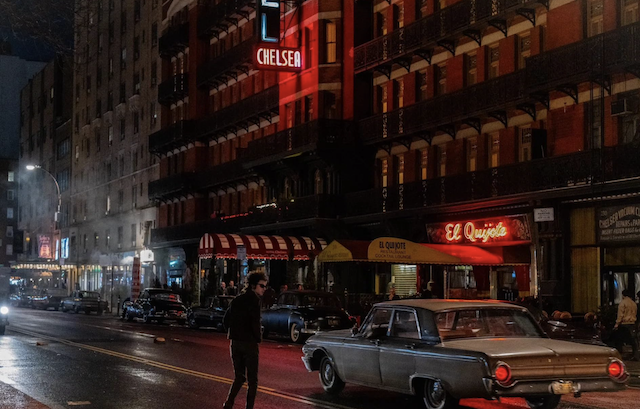
©Courtesy of Searchlight Pictures
Q: But typically, I’m just going to push a little bit on this because throughout your career you had a bit of a pied piper effect on people. People tend to want to go where you let them, [audience cracks up] hopefully not with certain collaborations, maybe not so much with the Campbell one, but even with your collaborations with Denis and Dune, there’s a real moral message in those movies. And I’m wondering after this one where you’re talking about an artist who has used his gift to try and amplify the message, if there’s any direction that you’re thinking, I mean obviously you’re a tremendous singer, would you ever do an album.
Timothée: That’s a major compliment. I really appreciate it, but I dunno if there’s a moral message in this movie. I disagree with the notion that Bob Dylan was trying to make things better. I think he just wanted to put a light on something, this is a man who stayed definitively apolitical his entire career, he’s shone a light on something and when the community said, Hey, you’re our guy that shines a light on problems. He said, no, I’m not. And he went over here and he said, oh, he went over here. He said, no, I’m not over here. What pressure put on anybody, any person forward for us? I think it’s not the role of the artist in a sense. And you get weary of times or notions that hey, when something’s presented better or ethically uplifting that it’s a good, that’s not the point of art respectfully or at almost so you speak these pretentious times,
Elle: You answered it very well. But I think what’s inspiring also about the film and because I also think Jim is a lot like Bob in this movie in a lot of ways because Jim and his career, how he’s navigated so many genres and doing, he’s avoided people, putting him in a box in his art, much like Bob from 61 to 65 here specifically this time. I think it was inspiring for me as an arts for anyone just to not let someone organize you in this way. And it is cheesy, but it’s like you have to follow your instincts and follow your heart and yourself. And sometimes it can be polarizing and confusing, but it’s important for us as human beings to evolve and to change.and tell the story.
James: Well I think, don’t you think art making is in the sense for a lot of us, I certainly think continuous this, it’s about doing like fingerpainting. You don’t always have to do the fingerpainting going, here’s the result I’m looking for from the public. And I think too often it’s part of what happens when we have talks is that we turn it into results and what it’s about. But sometimes it’s about he’s a beautiful musician and he likes playing with sound and word and says, shines a light here. But the second everyone tries to box in that sound and word just define it, it loses appeal to him.
I’m projecting because Elle said I have my own modest way and I’m not interested in being the thing that you define it as. I mean, I just love working with those paintings and I project that on him. But I imagine that that’s some of the reticence to define himself. Are there boundaries that make it easier to write an article or conduct a Q&A that don’t necessarily be easier to act or to make a painting or write a song because they’re actually incredibly confronting, oh, I’m in that genre. I’m not supposed to do that. Maybe you can, all that stuff is intellectual stuff that gets in the way of that primal cave painting thing. That’s pretty amazing, but that’s just my 2 cents.
Q: Well, I’d say let’s wrap it up on what your film points out. the relentless power of progress which leads to these innovations, right? Yes. and we need this amazing stuff. And we’re just really thrilled that you all could join us on this incredible evening.
If you like the Q&A, share your thoughts below.
Check out more of Nobuhiro’s articles.
Here’s the trailer of the film.

